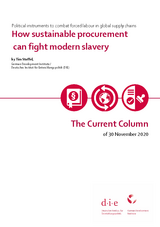The Current Column
Political instruments to combat forced labour in global supply chains
How sustainable procurement can fight modern slavery
Stoffel, TimThe Current Column (2020)
German Development Institute / Deutsches Institut für Entwicklungspolitik (DIE), The Current Column of 30 November 2020
Far from being a relic of the past, slavery remains a global problem that has to be taken seriously. It is still present in its modern forms – such as forced labour and wage slavery – to this day, including in Europe and particularly in international supply chains. Slavery has officially been banned around the world since the Universal Declaration of Human Rights was issued in 1948. Just one year later, the UN General Assembly designated 2 December as the International Day for the Abolition of Slavery. Yet despite all the efforts to eliminate the problem of modern slavery, we still keep hearing about products whose manufacture involves its use. According to estimates by the International Labour Organization (ILO), over 40 million people still live in conditions of modern slavery. Nearly 25 million of these are victims of forced labour in factories and on farms, as domestic workers or on construction sites. Many work as part of global supply chains, some of which end here in Europe.
The NGO Electronics Watch, for instance, has documented cases of unlawful recruitment fees that lead to bonded labour in the manufacture of printers, hard drives and other computer accessories in Thailand. The “Clean Clothes Campaign Germany” is demanding an end to forced labour in the Chinese province of Xinjiang. Cases of bonded labour and restricted freedoms for female textile workers, who have their passports confiscated or are forced to live in company accommodation, have been reported in Bangladesh and India. Even supply chains that are already undergoing increased checks by NGOs and companies can harbour breaches of national and international law. There are frequent cases of modern slavery in the agricultural and raw materials sectors too, in areas including mining for rare-earth metals or growing cacao.
Like many other social problems in international supply chains, attempts to find a solution have long focused on making appeals to private consumers. So far, however, these efforts have not succeeded in ending modern slavery, which is embedded in the structural fabric. Modern slavery, forced labour and other social challenges in international supply chains cannot be defeated with a single piece of legislation or one specific initiative. Instead, what is needed is a “smart mix” – to use the words of the German Council for Sustainable Development – made up of various policy instruments. Over the past few years, political decision-makers have relied increasingly on putting private companies under legal obligations that replace or supplement voluntary guidelines. Sustainable public procurement is another tool that serves this purpose. Incorporating social criteria into public procurement, which is estimated to be worth EUR 2.4 trillion in the EU alone, generates a real incentive to ensure fair working conditions in supply chains.
The voluntary commitments entered into by various industries – such as the UN Guiding Principles on Business and Human Rights and the OECD Guidelines for Multinational Enterprises – are increasingly being complemented by national legislation. The most prominent example of this is the UK Modern Slavery Act 2015, which expressly addresses the issue of modern slavery. Legislation governing companies’ due diligence obligations for human rights serves the same purpose as well as covering other fundamental labour rights such as the ILO’s core labour standards. France’s adoption of such a law back in 2017 fuelled the debate in other countries too, with Switzerland set to decide on one of its own before the end of this month. Meanwhile, Germany and other European countries are already formulating and debating initial draft legislation.
Sustainable public procurement also means a ban on forced labour (ILO Conventions 29 and 105). In practice, however, which specific aspects are taken into account is determined on a very selective basis. In 2017, the UK government issued a “Call to Action to End Forced Labour, Modern Slavery and Human Trafficking” at the UN, which has since been endorsed by 85 countries – as yet, Germany is not amongst them. This Call to Action identifies public procurement practices as the most important instrument for tackling the problem.
Removing modern slavery and forced labour from supply chains requires several measures working together – the “smart mix” – to result in a way of doing business that is more sustainable in social and environmental terms. By introducing and monitoring social criteria, sustainable public procurement can play a key role in both combating modern slavery and achieving much more besides. National governments and the EU now need to enshrine this mix of instruments in law to avoid a patchwork approach and create a level playing field for all market participants. They must also provide the necessary support to all parties involved, from private companies to public-sector contracting authorities. This is the only way in which due diligence obligations for human rights can be enforced in as many global supply chains as possible.


